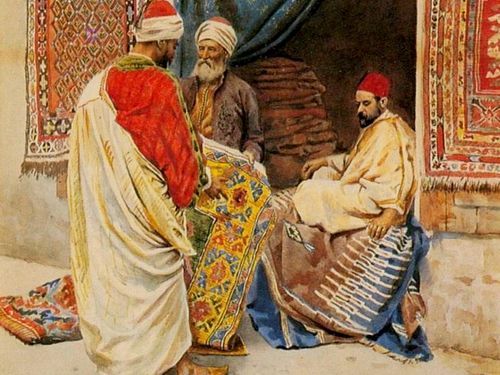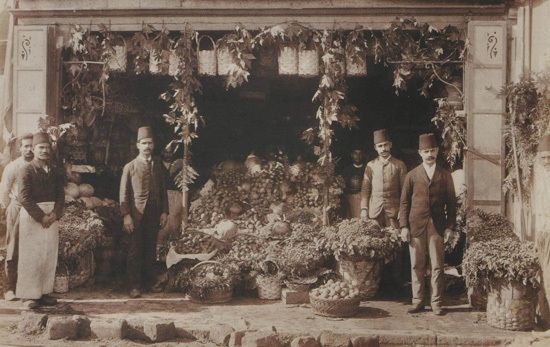.jpg)
NO RETIREMENT BEFORE THE GRAVE
There is no concept of retirement in Islam. Everyone works as long as they are able. When they become unable to work, the wealthy live off their own wealth. The poor, on the other hand, benefit from social security provisions…
In an Islamic state, the sustenance of those who are unable to work is not covered by social insurance but by relief funds. It is also the duty of the state to help needy Muslim or non-Muslim citizens sustain their lives through institutions such as Islamic foundations (waqfs) and the public treasury (bayt al-mal). The fourth category of the state treasury's expenditures is allocated for these expenses.

To the Victor Belong the Spoils!
In the Ottoman Empire, state officials did not receive salaries. Judges (qadis) sustained themselves through the fees paid by those who applied to court. The livelihood of their assistants, such as scribes and bailiffs, was also covered from these fees. Other state officials like viziers and governors were allocated rental income from a specific piece of state land. Their entourage was called “kapı halkı” (household). These officials selected their own personnel and paid their salaries themselves. These entourage members would come and go with the high official. Most of them were from the official’s own slaves. In this way, both loyalty and harmonious work were ensured. This method, which was the opposite of the merit system applied to central officials and is also called a patronage system, was fully implemented in England until 1833 and partially thereafter. This system, known as the spoils system, is still widely practiced today in the United States. Presidential appointees come into office with the president and leave when his term ends.
Judges of high or low rank would serve for a specified term; when the term ended, they were considered dismissed. During this period of dismissal, since they had no salary, they lived off what they had saved during their service or taught in madrasas. If high-ranking officials who were dismissed were not appointed to another position, they would go through a somewhat difficult dismissal period. In such times, tax revenues of a place were allocated to these high state officials. They would send deputies there to collect the revenues.
Viziers and governors could also be dismissed and appointed to a lower position. There were grand viziers who were dismissed and appointed to an ordinary governorship; and chief religious authorities (Sheikh al-Islams) who were dismissed and then appointed as ordinary judges. There was never an Ottoman statesman who said, “I will not take a post of lower rank.”
Among high-ranking officials, scholars, and timar-holding (fief) cavalrymen, it was customary to retire and receive a pension. Senior scholars were appointed to remote towns in the nature of a pension. Due to their rank and age, they would not go in person but would send a deputy instead. This deputy was called an “arpalık naibi” (deputy for the barley allowance). The term "arpalık" (barley allowance) subtly implies: “It is not our place to pay a salary to a person of your stature; let it be barley for your horse.” The deputy would preside over cases, collect court fees, take the amount designated for himself, and send the rest to the person he represented.
When members of the elite Ottoman infantry corps (Kapıkulu soldiers) aged, they would receive a pension called “oturak.” If they died without heirs, their assets would go to the corps’ central fund. This fund was a mutual aid fund established with contributions from the soldiers. In fact, the Arabic word “taka’ud” comes from the root “qa'da” (to sit). It literally implies “to sit back” or “withdraw from active duty,” which is why in Ottoman Turkish and modern Arabic, it came to mean “retirement.” Timariot cavalrymen in the provinces who became unfit for campaign would have their capable sons or brothers appointed in their place and themselves would retire with a certain timar allowance.
Eunuchs serving in the palaces had established a mutual aid fund among themselves by saving from their salaries and paying contributions. When the monarchy was abolished and the Ottoman palaces were dispersed, this fund enabled them to help each other.
Artisans who could no longer work due to old age, illness, or disability were called efrad-ı gayriamile (non-working members) and were supported by the artisan guild’s mutual aid fund (teavün sandığı). Artisans paid dues to this fund, which were collected and invested by a trustworthy person. Generally, the artisan’s son became an artisan, the janissary’s son a janissary, the professor’s son a professor; they would continue their fathers’ work and take care of them. Society was organized in this way.

Toward a Pension Fund
After the Tanzimat reforms (1839), the entourages of statesmen and judges were considered civil servants. Salaries were assigned to officials according to their rank. A principle was introduced that they could not be dismissed without fault. Non-Muslims were also given the opportunity to become officials. Due to increasing needs, the number of officials expanded.
In the Ottoman Empire, timariot cavalrymen collected state land rents and maintained soldiers in return. During Sultan Abdulmejid’s reign (1847), the timar system was abolished. The remaining timariot cavalrymen were retired with half of their timar income. Some of them were converted into mounted gendarmes. In fact, after the Tanzimat, retirement benefits were introduced for all officials. During this period, separate retirement laws were enacted for scholars, military personnel, and civil servants. The first of these was the Military Retirement Fund established in 1866. This was followed by the Pension Fund for civil servants in 1881. Separate pension funds were later established for workers employed in various industries.
The Rich Are Responsible for the Poor
There is no concept of retirement in Islam. Everyone works as long as they are able. When they are no longer able to work, the wealthy consume their own wealth. The poor benefit from social security provisions. In fact, giving charity such as zakat (obligatory almsgiving), fitra (alms at the end of Ramadan), adaq (vows), and nafaqa (financial support) to the poor is a religious and legal obligation imposed on the wealthy. In Islamic society, everyone is responsible for one another. The wealthy are also responsible for the poor. Classical religious sources state, “If someone dies of hunger in a city, and the rich who knew about it did not help, they are considered murderers.”
Önceki Yazılar
-
THE WATER OF IMMORTALITY IN THE “LAND OF DARKNESS”28.01.2026
-
THE WORLD LEARNED WHAT FORBEARANCE IS FROM SULTAN MEHMED II21.01.2026
-
THE RUSH FOR GOLD14.01.2026
-
TRACES OF ISLAM IN CONSTANTINOPOLIS7.01.2026
-
WHO CAN FORGIVE THE KILLER?31.12.2025
-
WHEN WAS PROPHET ISA (JESUS) BORN?24.12.2025
-
IF SULTAN MEHMED II HE HAD CONQUERED ROME…17.12.2025
-
VIENNA NEVER FORGOT THE TURKS10.12.2025
-
THE FIRST UNIVERSITY IN THE WORLD WAS FOUNDED BY MUSLIMS3.12.2025
-
WHO BETRAYED PROPHET ISA (JESUS)?26.11.2025